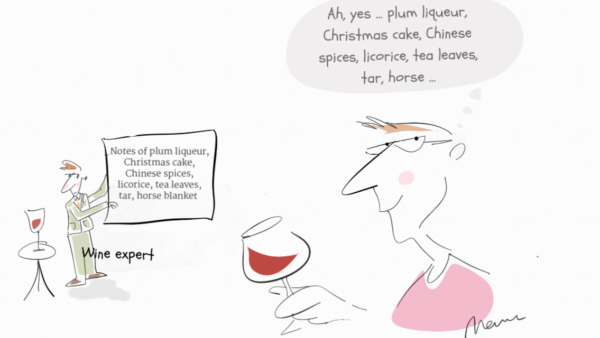
There was a time when the tasting note was a wine insider’s tool. Sommeliers, cellar masters and wine brokers, whose job it was to make purchasing decisions made use of them to note the character and quality of what they tasted. For these folks, a hastily-scribbled note in an old leather pocket book was a simple aide memoire; a means of keeping track of the ups and downs of vintages; a rough sketch to be referred to now and again as business required. The plainer and more concise the better.
The tasting note as we know it today seems to have emerged from the shadows into public visbility sometime after WWII, as newspapers and lifestyle magazines saw their readers’ rising interest in wine as an element of contemporary domestic life. In the hands of people like Frank Schoonmaker, Alexis Bespaloff and The York Times’ Frank Prial, a tasting note consisted of a few generalized comments on the overall impression made, a nod to its relative quality, value and suitabiity.
This changed dramatically when, in 1978, a young, lapsed lawyer named Robert Parker Jr. began distribution of a modest wine newsletter. The Wine Advocate, with its 100 point rating scale, rapidly became the most influential wine publication in any language. But Parker had more than points to offer. His tasting notes were detailed, florid, fussy things that attempted to tease out nuances others seemed to have overlooked — and they were game changers. If Alexis Bespaloff was wine writing’s Hemingway, in Parker it found its Henry James.
Today, the Parker-style tasting note is ubiquitous, the standard model of the genre, and reliant on a lengthy catalog of fruits, vegetables, spices, crushed stones and cat pee to accomplish its task, which is … exactly what?
Its fine to make use of the kind of tasting note that provides factual context for a wine, but it’s another matter entirely if one begins approaching wine as if it were little more than a tasting note presented in liquid form. Wine cannot speak for itself when the experience it should be providing on its own terms is preceded, mediated and, in the worst imaginable case, actually determined by something we’ve read.
Are we tasting wine, or just tasting tasting notes? Let’s hope it never comes to that.